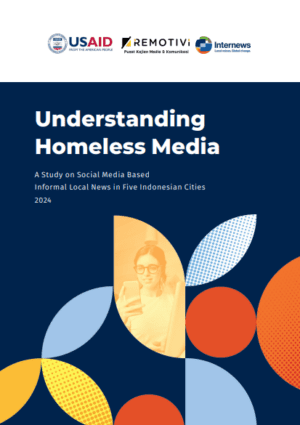Read the Report
Internews-supported research “Understanding Homeless Media: A Study on Social Media-Based Informal Local News in Five Indonesian Cities” explores the rise of informal news outlets that operate primarily on Instagram and other social media platforms. The term “homeless media” is a seminal term used for the lack of website that is regarded as the “home” for the publication. These media social media accounts deliver news and information and pose like news outlets in their contents and gained popularity through their rapid and locally resonant coverage. The study focuses on five major Indonesian cities: Medan, Jakarta, Bandung, Yogyakarta, and Surabaya. Through content analysis of 3,000 posts and interviews with the founders of these homeless media outlets, the researchers investigate how these platforms have emerged, their content strategies, and the role they play in the local media landscape. Audience feedback, gathered from focus group discussions, indicates that while people rely on these outlets for timely local news, they also express concerns about misinformation and credibility.
Many of the outlets featured in the study are operated by a small team, often just one or two individuals, and began as personal or community-driven projects. They evolved into news centres as citizens started submitting incident reports and local information, thereby increasing audience engagement. Most of the content focuses on crime, local events, and human-interest stories. These outlets’ flexibility allows them to quickly respond to the information submitted by their audience. However, their informal nature raises issues related to governance. Many are not legally registered, heightening concerns about misinformation and the lack of adherence to basic journalistic standards. Despite these challenges, homeless media have succeeded in filling gaps left by traditional media, which are often limited by institutional practices.
A major concern highlighted by the study is the precarious dependence of homeless media on social media platforms. Risks such as account bans or hacking threaten their existence, and many outlets lack strategies to mitigate these vulnerabilities. Furthermore, homeless media’s reliance on user-generated content makes them particularly susceptible to the spread of misinformation, although some outlets have developed informal mechanisms to filter false information. The study concludes by recommending capacity-building programs to enhance the journalistic skills of homeless media operators and suggests fostering closer collaboration with traditional media to improve credibility and content quality.
